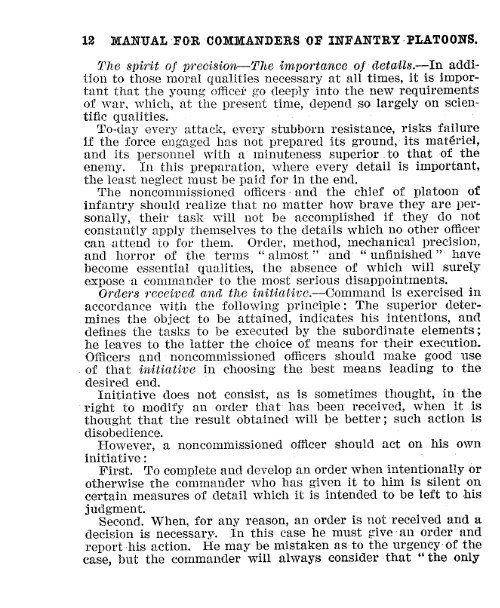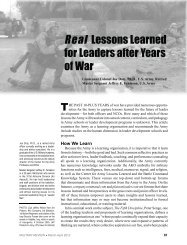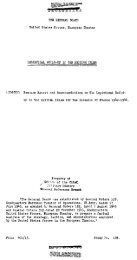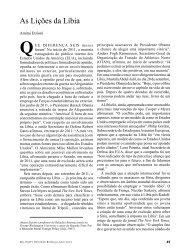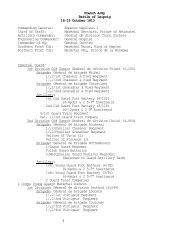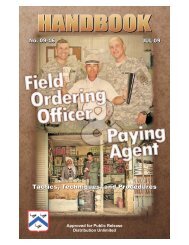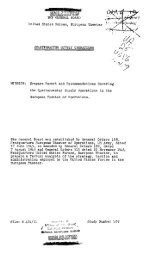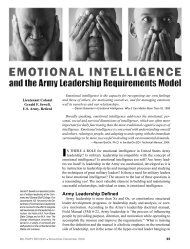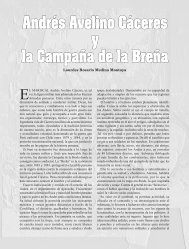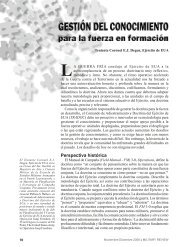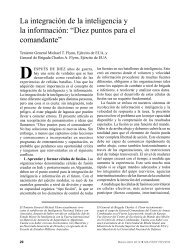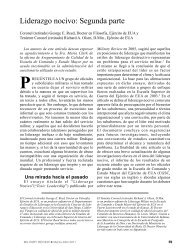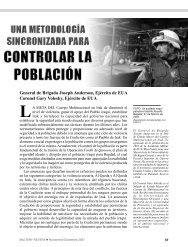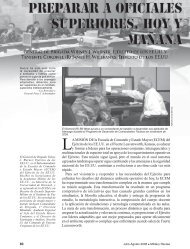- Page 1 and 2: TRANSLATEDDFROMkTHE FREN~hCH (EDITI
- Page 3: Thle followrring W7AnI DEPAlITMJENT
- Page 6 and 7: B TABLE~h OF CONTEN%~aTS. Page. Cha
- Page 9 and 10: MABNUIAL FOR COMMIANDERS OF: INFANa
- Page 11: MlarNUaL ]FOR CO1~MANDERSTDH% OF iN
- Page 15 and 16: MAT·NUAL( F~OR~ COMMANE~liDERS OF
- Page 17 and 18: M6ha~TANUA FORBCOMMANB~DERS OF INFA
- Page 19 and 20: ELEJ~E~STAR TRA INIG OF INFtANITRYM
- Page 21 and 22: MAN~B~UAL: FOR; CO~NMMANDERSE OF IC
- Page 23 and 24: MANUAL FOR COMMANBDERSW OF INFANTRY
- Page 25 and 26: MIA]NUALT FOR COMMAND~6~RD ERS OF I
- Page 27 and 28: MANUALT89 FORt COMMAN81~DERS OF INF
- Page 29 and 30: MANI~UaL%FORe COM~66ANDUD3 RS OF IN
- Page 31 and 32: IMANUAL~~ FORn COl~lN A~~IDERS~hOF
- Page 33 and 34: f(A~6NUAL FORR COM:Y~MANDE~i:RS O~F
- Page 35 and 36: M~ANUAL FOR CO113f~MMANDERS 'OF IFA
- Page 37 and 38: MadANUAL. FO·R, COQMM;AN~DERS OF I
- Page 39 and 40: MAL~NUA~PL. FOe COMMIVAND'E~R;S OF
- Page 41 and 42: MANUAL FOR COMMA6LNDERS OF INFANT~R
- Page 43 and 44: MALN~UAL FOR CO1YL~AND~ERS OF INFPA
- Page 45 and 46: MNUq~AL FOU COMMAYTNDERS OF INFANTR
- Page 47 and 48: MANUAgt~L FOR COMMP(A;ND.ERS. OF IN
- Page 49 and 50: IA~NUA;L FOR COMMPAbNDERS~ ODFINFAN
- Page 51 and 52: MANUAL FOR COEgMMANDERS O)F INFANTR
- Page 53 and 54: MsANUAL FOR COrMMANDBERS OF INFANT~
- Page 55 and 56: MANUAL FOR; CO)MMANDERS OF` INFANRY
- Page 57 and 58: MANUALT~b FORt COMMAN~DEERS OF 1[iN
- Page 59 and 60: MANUAL, FORL ~COMMA~NDIERS+ OF INFA
- Page 61 and 62: MIA~NUA~L FOR) COIVM[MANDERS~ OF IN
- Page 63 and 64:
M~ANuAL FOR ,c.OvmMAN;DEUS OsF INFA
- Page 65 and 66:
MA~hiTALf FORC COMMcANDERS ObF INFA
- Page 67 and 68:
PART~l III. MA~TERIEAL.; CHAPTEIR I
- Page 69 and 70:
MANBUACL FO)R COMIMtNDERS OF IN~FAN
- Page 71 and 72:
MANMAL FOR COMMYANDERS OP INFANTRY
- Page 73 and 74:
iVIaNApL FORaCO1VIIMADEIS~ OF IN~Fd
- Page 75 and 76:
Ml~PaNUAL :FORl~ _COIAI2WANERS OaF
- Page 77 and 78:
~wa~.AWUA 'FOR: _CO~~iA~~.DD E S :O
- Page 79 and 80:
1~lf~ANUAL ~FORt COIIBM1VLAKDER O]F
- Page 81 and 82:
IVA'NUAL FOR. CO)~WMAN~DBRS OF INFA
- Page 83 and 84:
MANUAL FOR COMMAN~BDERS OF INFANTRY
- Page 85 and 86:
M~ANUAL FOB CO~MnMANDERS OF· INFAN
- Page 87 and 88:
MAfC~NUAL FO~R:COMMANDB]OERS. OF 'I
- Page 89 and 90:
~I;A1OUAL FORi CO~'lYLND~RERS OF IN
- Page 91 and 92:
3~dANUALIG PQR COIV6~LMAItDERSfR OF
- Page 93 and 94:
KA~EFTIAL FQOR COMMANDERShE' j~, OF
- Page 95 and 96:
Mia~btJAL FOR csaNssiala~ERS C OF I
- Page 97 and 98:
IMANAEgLC] FOR CO'lMMANDERS O3F INF
- Page 99 and 100:
YLA~SNUACL':R F :O~RCOMMANDERS - OF
- Page 101 and 102:
XAINUAL FORR COM1S~JANDE·RS: OF I~
- Page 103 and 104:
ma~iUAL~cnFOR E COMANIMDERS OF' ji~
- Page 105 and 106:
~$AC~flTL EOTZCO~Fi.I:MMA)PDE1 OE I
- Page 107 and 108:
MAN~~WUALZ POIt~CO~IMAY~~NDB1iS OFI
- Page 109 and 110:
WTUA~~~IJ'kZ- FO G)Rl~O:~JI~~~~~rMA
- Page 111 and 112:
~aNU4BsL POPI: O9X~A-NEI~RS OP IANI
- Page 113 and 114:
IY6ANTUAL;I .'O.RQ-CO1W~-aMANDE)E R
- Page 115 and 116:
~MAP1TAXs 3FO~ECOIMMATNDERS OF INFA
- Page 117 and 118:
MA~:~3~PAL~i~·CO~bLTAN~DERSR- 3FOR
- Page 119 and 120:
~M~ASN~tTA POR;3t~ ~~CO1M&TMADI~ ~S
- Page 121 and 122:
~P49U8V ; L 00~~AD~Y~~IRS QB~3' ,N~
- Page 123 and 124:
MANU~AL: 3FOR~: CO~MaMANDERS_ OF IN
- Page 125 and 126:
lnole. ,ateraectiops · instead ~of
- Page 127 and 128:
M6ANUAL FO]R COMMIVANiDERS OF INFlA
- Page 129 and 130:
MANbEUAL FOR, COMM~IANDERS- OF ~NFA
- Page 131:
-1lrnH ~lrHI(1( -CI __m~ 0 0~rNr/r~
- Page 134 and 135:
132 ]~ENUAL FOR CO1M~VAW~hBE1LS OF
- Page 136 and 137:
134 MANUA$L FOR COBYii[MA~fE S OF I
- Page 138 and 139:
130 IL~RTANUA FOR COI'd\:1~~Nfl/ANE
- Page 140 and 141:
138 IMA'NUAL FO~R COMCMANDERS OIFIN
- Page 142 and 143:
140 MANUAL FOR COMMANDERS OF INFANT
- Page 144 and 145:
124 MANUAL FOR; COrMbMANDERS OF INF
- Page 146 and 147:
144 MyANcUALE FOR COMP3[MAND~BERS O
- Page 148 and 149:
140t MA~NUAL POR CtOMMATBflERS OP I
- Page 150 and 151:
148 Ma1Q~UAL POR COMMANDEflS OP I1N
- Page 152 and 153:
160oM;ANUABL P0R C0~WMBTANDEu OF XN
- Page 154 and 155:
152 MAN~U;AL FOR COMMANDERSE B OF Z
- Page 156 and 157:
15~4 MTfaNUAL ~'oR COMIPTANDERS OF
- Page 158 and 159:
15;6 1MANUAL FOR COI~d1VIANDERS O)F
- Page 160 and 161:
158 NABNUAL FORI CONXIANDERS OF INF
- Page 162 and 163:
160 MIYANU~JAL FOR, COMMAND~'BERS~
- Page 164 and 165:
102 M[ANUAL FOIR COMMI~ANaD1ERS OF
- Page 166 and 167:
164 ~vANUAL~LB FOR7.: COMattf~ LAND
- Page 168 and 169:
166 IhTANUtAL FO]R .CO1V~MANDWERS:
- Page 170 and 171:
168 MANUAL FOR COI61CMMANDER O)F IN
- Page 172 and 173:
170o IvIANUL FOR· OOM1~CBANDDE· R
- Page 174 and 175:
172 MaNU~haL FOR cOaN~~vaDERS OF IN
- Page 176 and 177:
17'4 M~ANUAL FORLE COMMG~ANWDERS O)
- Page 178 and 179:
176i MJANUAL FOR COMM[6~~ANDERS OF
- Page 180 and 181:
178 MAdNUAL; FOR COMMBANDERS OF INF
- Page 182 and 183:
180 IVaNUAaaL FOReCOMMaND~~oERS OlF
- Page 184 and 185:
182 ~CNANUAL FOR CO]~LtITANDERS OF
- Page 186 and 187:
184 IYANUATlrlFOR%COIfIfANDERS OF6;
- Page 188 and 189:
186' MANEUALPr OR COMa;MANDERS OF I
- Page 190 and 191:
188 MrANUAL. PORC :COMMJlA)~NDERS o
- Page 192 and 193:
190 MANUvAL FOR COM1d~LANhDERB OF I
- Page 194 and 195:
192 M'ANU~AL iFOR CONIMMANDERS. OF
- Page 196 and 197:
12~4 TvmaNU~aL FOR.;COMTILANDERS OF
- Page 198 and 199:
iGO I~NUALN~dP;COMMANDERS FOR OF IN
- Page 200 and 201:
19~8 MANUALw~a FsOR ICO ENTANDE:-Ot
- Page 202 and 203:
200 ~IXANUALe FOR COMVf&ANDERS OF I
- Page 204 and 205:
202 IM~ANUAbL FOR COMMWLANDEIRS OF
- Page 206 and 207:
204 MANUAL FOR COMMANDERS OFPINFANT
- Page 208 and 209:
206- MVANUALa FO6R CO1)~n~INMA~RSFl
- Page 210 and 211:
208 MANUAL &FOIR COMMAllNDERS. :OF
- Page 212 and 213:
33f ~ · ~C ERSB OF I[NFANTRY PLA;T
- Page 214 and 215:
2~2 ANUAL4'I FORW GQ~COMMBANDER OFE
- Page 216 and 217:
214 MANUALAFOR1 COMMA DERS OF.~ Z T
- Page 218 and 219:
S~16 ~LNUtaLra P8R COI~TMADERS or I
- Page 220 and 221:
218 1~aNUvlaL FO~R COBI1MTANDERS·~
- Page 222 and 223:
220 MA~NUAL FOR COMMANDER~~~~: S·
- Page 224 and 225:
222 M~V~~~~ANUAeaoMMw~aNi~Da FO C E
- Page 226 and 227:
224· MA~NUACL FORt COWMMANDERS OF
- Page 228 and 229:
226 MWANUAL FOIR · COMMANRDERS OFI
- Page 230 and 231:
8RB MIN8ar, poB cosl6kNoEas op .IwP
- Page 232 and 233:
2~30iMAN(UAL FOR CONMMANIDERS OF IN
- Page 234 and 235:
232s MtANUAL FO)R COMMCEANDERSE ~ O
- Page 236 and 237:
f334 2ANUAL FO~R CO1VUY'ANDBERS OF
- Page 238 and 239:
236 IVIANUAL FOR. C.OMMANDERS OF IN
- Page 240 and 241:
238 MANUALC FO)Ri COMMANDERS OF INF
- Page 242 and 243:
2~40 MANUAL FOdR COMMZIANDERS OF IN
- Page 244 and 245:
,242 IMCANUAL FOR1 CO1b/flANDERS OF
- Page 246 and 247:
244 MdANUALa FORB COMMANDERSBBB OF
- Page 248 and 249:
.246 MABNUAL FOR COMM3ABNDE]RS OF I
- Page 250 and 251:
248 IurLartUal Po1 CO A3~Y1'TDERS&
- Page 252 and 253:
250 MEJANUAL FOR, COMM1ANDERS· OF
- Page 254 and 255:
f252 B6ANIUAL FOR. COMaMA~NERS -OF~
- Page 256 and 257:
254 MANUATL FO·R COMEANDERS OF INF
- Page 258 and 259:
25i6 MbANEiUAL FOR COIMIMANDERS. OF
- Page 260 and 261:
258sl MAINUAL FOR COMMANDERSR$OF IN
- Page 262 and 263:
260 Mv'aNUaL FQU C0IM~ta~~a UR QFr~
- Page 264 and 265:
262 MA~NUAL FOR COMMAN~~DERS OF INF
- Page 266 and 267:
2ti4 I~A3~AL~~rr'~~ FRCOMMr~a]~DERS
- Page 268 and 269:
266 ,MAgNUA~LFOR COMMANDERSE3S OF I
- Page 270:
2~s8 MAr~NUALF`OR C~OM~IMAPD.ERS OF


